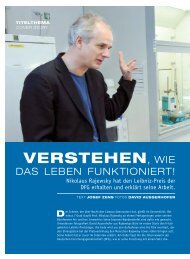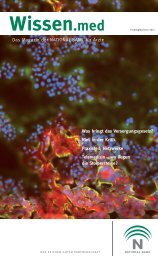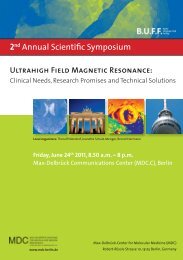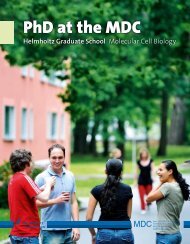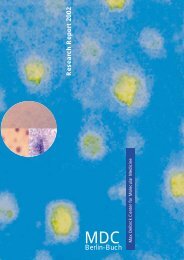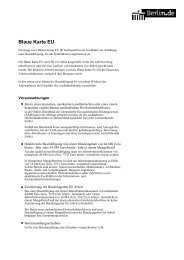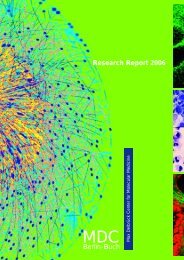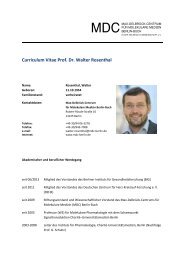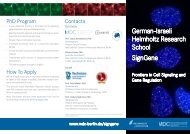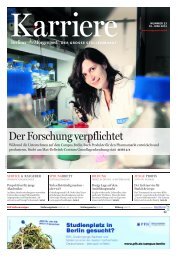Research Report 2010 - MDC
Research Report 2010 - MDC
Research Report 2010 - MDC
You also want an ePaper? Increase the reach of your titles
YUMPU automatically turns print PDFs into web optimized ePapers that Google loves.
Markus Landthaler is an outstanding scientist in the field ofpost-transcriptional regulation and RNA binding proteins.His research aims for a systems level understanding of posttranscriptionalregulation and a transcriptome-wide highresolutionmap of RNA-protein interaction. MarkusLandthaler’s detailed research profile appears on page 62.The Genomics Platform is lead by Wei Chen, an expert innext-generation sequencing technologies and their applicationto systems wide approaches in genomic research.Christoph Dieterich heads the Bioinformatics Platform andwill perform and support the computational side ofgenome-wide analysis and bioinformatics. The third platform,headed by Stefan Kempa, will enable to <strong>MDC</strong> andBIMSB research groups to analyse the proteome andmetabolome by mass-spectromentry in a high-throughputformat. The integration of the technologies of all scientificplatforms will support systems-wide understanding of complexregulatory mechanisms.Another focus of the BIMSB is the international and interdisciplinarytraining of young scientists, especially PhD students.A first step has been to develop a meaningfulexchange program jointly operated by the <strong>MDC</strong> and NewYork University (NYU) in the United States. Other internationalpartnerships and scientific exchange programs arebeing negotiated, e.g. with Kyoto Medical School, Japan, andfurther systems biology institutes in the USA. Within the<strong>MDC</strong>-NYU PhD exchange program students will carry outcollaborative projects between the Center for FunctionalGenomics in New York and the BIMSB in Berlin and mayspend up to 50% of their time in either location. They are comentoredby NYU and <strong>MDC</strong> faculty and can participate inprojects and classes at both institutions. In 2009 this collaborationhas already led to important publications and manyothers are in the pipeline. Additionally, the BIMSB is veryactive in coordinating scientific workshops for communicationand collaborative efforts with local, national and internationalpartners.PartnersBy definition, systems biology must be open to the integrationof a wide range of expertise. The BIMSB’s strategic concepthas been developed in collaboration with virtually alllocal universities and scientific institutions in Berlin as wellas other partners in Germany. Several projects funded by theBMBF, Helmholtz Association, the DFG and other sources areongoing between BIMSB investigators and collaboratorsthroughout Berlin.tein-Protein-Interaktions-Netzwerken und posttranslationalenModifikationen zu verzahnen.Modernste Sequenzierungs- und Massenspektrometrietechnologienin Verbindung mit modernen bildgebenden Verfahrenund biochemischen Methoden werden eine genomweitequalitative und quantitative Analyse der Regulationsmechanismen,insbesondere der Aufklärung der RNS-Funktion aufden verschiedenen Hierarchieebenen, ermöglichen.BIMSB Forschergruppen, wissenschaftlichePlattformen und das Internationale PhD-Austausch-ProgrammInnerhalb der erst kurzen Laufzeit konnten bereits herausragendejunge Wissenschaftler als Leiter unabhängiger Forschungsgruppenund wissenschaftlicher Plattformen imBereich Genomik, Proteomik und quantitative Biologie rekrutiertwerden. Die hier im Bericht aufgeführten Beispiele der laufendenForschung zeigen, wie ihre Arbeiten die Gesamtmissiondes <strong>MDC</strong> in der „Molekularen Medizin“ ergänzt und erweitert.Markus Landthaler ist ein hervorragender Wissenschaftler aufdem Feld der post-transkriptionalen Regulation und der RNSbindendenProteine. Er arbeitet an einem systemischen Verständnisder post-transkriptionalen Regulation und an einertranskriptom-weiten hochauflösenden Karte von RNS-Protein-Interaktionen.Sein Forschungsprofil wird im vorderen Teildes Berichtes detailliert dargestellt (Seite 62).Die Genomik-Plattform wird von Wei Chen geleitet, einemExperten für die neue Generation von Sequenziertechnologienund ihre Anwendung in der systemweiten Genomforschung.Christoph Dieterich leitet die Bioinformatik-Plattform und wirddie algorithmisch-bionformatische Seite der genomweiten Analysenabdecken. Die dritte Plattform, geleitet von Stefan Kempa,wird den <strong>MDC</strong>- und BIMSB-Gruppen ermöglichen, das Proteomund das Metabolom mit Hilfe von Massenspektrometrie imHochdurchsatzformat zu analysieren. Die Integration diesermethodischen Plattformen wird ein systemweites Verständniskomplexer regulatorischer Mechanismen unterstützen.Ein weiterer Schwerpunkt des BIMSB ist eine internationalausgerichtete interdisziplinäre Ausbildung junger Wissenschaftler,speziell von Doktoranden. Ein erster Schritt ist dieEtablierung des Austauschprogramms, das gemeinsam vom<strong>MDC</strong> und von der New York University (NYU) in den USA organisiertwird und in 2009 gestartet wurde. Weitere internationalePartnerschaften sind in Vorbereitung, z.B. mit der KyotoMedical School in Japan und Systembiologie-Instituten in denUSA. Im <strong>MDC</strong>-NYU-Programm werden gemeinsame Projektezwischen dem Zentrum für Funktionelle Genomik in New Yorkund dem BIMSB in Berlin durchgeführt, so dass die Teilnehmerbis zu 50% der Zeit in der jeweils anderen Institution verbringenkönnen. Dies wird von den beiden Fakultäten gemeinsambegleitet und beinhaltet die Teilnahme an Seminaren in beidenInstitutionen. Diese Kooperation hat in 2009 bereits einePublikation in ‚Nature Methods’ ergeben. Insgesamt wird das192 Berlin Institute for Medical Systems Biology



